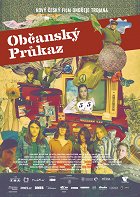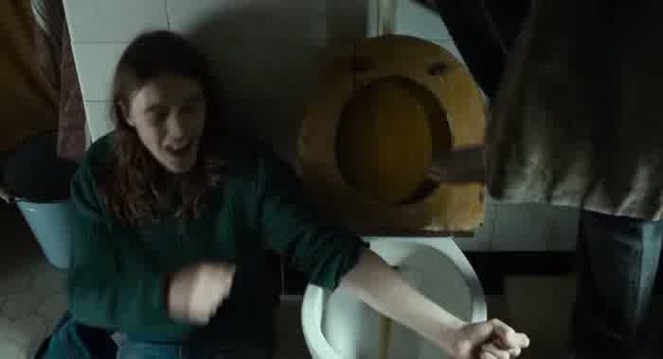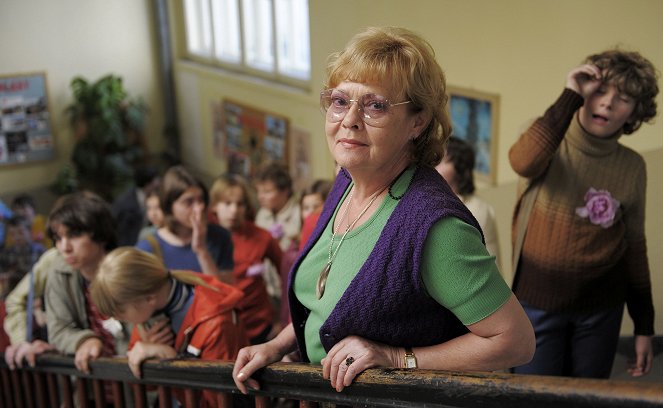Directed by:
Ondřej TrojanScreenplay:
Petr JarchovskýCinematography:
Martin ŠtrbaComposer:
Petr OstrouchovCast:
Libor Kovář, Matouš Vrba, Jakub Šárka, Jan Vlček, Aňa Geislerová, Martin Myšička, Jan Vaši, Jenovéfa Boková, Marek Taclík, Adam Kubišta, Лилиан Малкина (more)Plots(1)
Identity Card is taking place in Prague, between years 1973 – 1977. Therefore in the times of greatest normalization, in the times close after occupation of Czechoslovakia Socialist Republic by the army of Warsaw Pact. In the times when Big Beat and long hair ment resistence against socialism of Husak. Because of your identity card you were easy target for police hassling, while release from basic military service was a lottery win.
Moviemakers said about their movie: „In this movie you’ll see four classmates – Petra, which is also a narrator, and his three friends Popelku, Alese a Mitu. You will see period from when they are fifteen years old and get identity card up to they are eighteen years old and they are trying to release from basic military service. (official distributor synopsis)
(more)Videos (2)
Reviews (9)
A film with a pleasant, fresh and (with a few exceptions) not that well known of a cast, but which will be appreciated mainly by those nostalgic for the depicted era. For me, a person who didn't nod and say "Yeah, yeah, that's it" all the time while watching, because he simply didn't experience it, I was left with a strangely incoherent story made up of various episodes, a parade of typical Šabach characters (so nothing original either), an incredibly long runtime (it seemed a dull three hours to me) and otherwise nothing much. In short, another variation on a theme that has been seen several times before.
()
I am a generation (born in 1986) that has never experienced anything as ceremonial as the official issuing of identification cards. I have to say that I am quite glad because I have already had three graduations, one as the winner of the best bachelor's thesis competition, and I must say that it was also an event that did not impress me in any way. Everything was very official, staged. Still, it was better than the theater that young people had to witness during the socialist era. The depiction of the issuing of identification cards in this film is not necessarily epic, but it is definitely portrayed excellently. On one side, there are loyal communists, and on the other side, there are rebels who want to resist, even just a little. It was a sad time, and I am glad that I was born at a time when the communists' bell was tolling and a bright capitalist future awaited us. Yes, there is a bit of irony in that, but the review should not dwell on it. More: http://www.filmovy-denik.cz/2013/02/obcansky-prukaz-2010-75.html
()
Revolting, grinning, and sobbing. Considering how fed up I am with the places Czech filmmakers constantly turn, Identity Card is an incredibly uplifting experience. Additionally, the fact that Petr Jarchovský is the one writing for Ondřej Trojan this time is literally its salvation, because I wouldn't believe Jan Hřebejk's returns to the past even with a C cup.
()
Reviewing Identity Card consists of two important aspects for me. The first - the form - feels quite average to me, whether in terms of the acting performances or the fragmented screenplay and level of humor used. I don't share the enthusiasm of many regarding the performance of the group of boys in the main roles, as they lack charisma and acting talent. While Věra Plívová Šimková was not a star director, her films worked thanks to her talent for selecting child actors, whom she turned into stars one after another. The casting of the actors in adult roles is also good. I wouldn't label Geislerová a bad actress, but her stardom is more related to her appearance and media presence rather than top-notch character acting. Identity Card attempts to be a type of nostalgic tragicomedy, but that type of humor seems more forced and simplistic to me. So-called real socialism can be a target of humor at various levels; it was full of absurdity, hypocrisy, and stupidity, but not the kind where a high-ranking police officer is illiterate, as Ondřej Trojan tries to portray in his film. This and other aspects didn't work for me. The second content aspect of the film is more complex and deserves a deeper analysis. I classify Identity Card as one of those unpleasant pretentious films that pretend to be something they're not. With all due respect to the many reviews praising how well the film captures the lifestyle and atmosphere of the 70s, life simply wasn't like that. Czechoslovakia in the 70s was not a brutal dictatorship that relied on dances and Soviet soldiers. Soviet soldiers stayed in their barracks and for various reasons were prevented from interacting with locals and the local culture. It's about what kind of support the system actually had and whether there were really 15 million suffering victims, as the enthusiastic citizens claimed after November 1989. The system of normalized Czechoslovakia didn't rely on batons, as it may seem to the viewers of Identity Card, as they were rarely used. Instead, it relied on pragmatism, pretending, minor benefits, conformism, and spinelessness. Millions of people deeply despised the system, its highest representatives, and official ideology but willingly took advantage of all the benefits that the regime brought and provided. Whether it was the poor work ethic, various forms of "privatization of property in socialist ownership," the system of favors, acquaintances, clientelism, or the undeniable social benefits in the form of the so-called "goulash socialism," etc. There was a stench here, but also calmness. One had the certainty that they would still be where they were 20 years later and that their life would be stabilized. If Czechoslovakia had been open to the world, it would have had to deal with the decline of many industries, closing mines, and coping with oil crises, etc., several years earlier. At the same time, the system provided one huge advantage - the absence of personal responsibility. Which other country can say that its leaders and institutions were the target of the cruelest jokes and yet enjoyed such tranquility without strikes, demonstrations, various civic protests, etc.? Czechoslovakia represented one of the most stable soft dictatorships of its kind. But capturing the mediocrity, hypocrisy, pettiness, and spinelessness is a bit harder than showing beaten-up youth at a concert. In the 19th century, bearded intellectuals imagined that future generations would learn about their past through museums. In the 21st century, we know that museums are just nice monuments that few people care about, and the majority gain knowledge about history through films. Future generations will consider Identity Card to be a more or less truthful testimony of that time, even though there are only a few films that I would consider more misleading. This film, in particular, does not represent an attempt to come to terms with the past. It doesn't analyze the system, whose foundation, according to Trojan and Šabach, consists simply of police officers or creatures that are clearly identifiable and isolated. In reality, and paradoxically, the biggest victims of normalization were the holders of Communist Party membership cards who were crossed out and expelled from their positions and jobs during the purges. The overwhelming majority ended up in manual labor positions, while non-party members often benefited significantly from the system and took advantage of, for example, scarce goods to enrich themselves. My overall impression of this distorted view of Czech history is 40%.
()
(less)
(more)
The "something" that was missing between Pupendo's harmless nostalgia and the hard disillusioned Androš... and it's going to get worse, it's coming in Identity Card. A film about responsibility, rebellion, quiet dignity and the price of freedom can make you laugh through Šabach escapades, but at the same time cut into the living with nicely profiled and believable characters. Identity Card has one flaw – the narrative framework lacks a solid story pattern, and all the weight is borne by the central boy quartet. The boys are skillful and direct, but they have no chance to carry the weight of slow storytelling without Trojan's film losing its pace. A more consistent edit would certainly not hurt the overall concept. Luckily, there's always a Dylan Point heard just in time, and Trojan edits some first-rate scene into it, so I left the movie theatre with the uplifting feeling that everything’s not fucked as long as we could laugh (and recognize that we were laughing at ourselves) without awkwardness. Identity Card is able to do it, and let it be praised all the way to a pure and undiluted four stars. Along with Walking Too Fast, Czech film of the year.
()



Ads